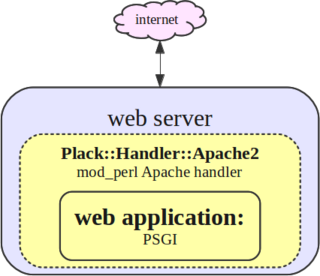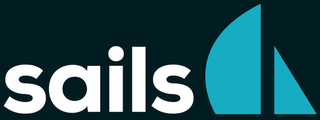
Server-side scripting is a technique used in web development which involves employing scripts on a web server which produces a response customized for each user's (client's) request to the website. The alternative is for the web server itself to deliver a static web page. Scripts can be written in any of a number of server-side scripting languages that are available. Server-side scripting is distinguished from client-side scripting where embedded scripts, such as JavaScript, are run client-side in a web browser, but both techniques are often used together.

Ruby on Rails is a server-side web application framework written in Ruby under the MIT License. Rails is a model–view–controller (MVC) framework, providing default structures for a database, a web service, and web pages. It encourages and facilitates the use of web standards such as JSON or XML for data transfer and HTML, CSS and JavaScript for user interfacing. In addition to MVC, Rails emphasizes the use of other well-known software engineering patterns and paradigms, including convention over configuration (CoC), don't repeat yourself (DRY), and the active record pattern.
The Web Server Gateway Interface is a simple calling convention for web servers to forward requests to web applications or frameworks written in the Python programming language. The current version of WSGI, version 1.0.1, is specified in Python Enhancement Proposal (PEP) 3333.
In computing, a solution stack or software stack is a set of software subsystems or components needed to create a complete platform such that no additional software is needed to support applications. Applications are said to "run on" or "run on top of" the resulting platform.
A web framework (WF) or web application framework (WAF) is a software framework that is designed to support the development of web applications including web services, web resources, and web APIs. Web frameworks provide a standard way to build and deploy web applications on the World Wide Web. Web frameworks aim to automate the overhead associated with common activities performed in web development. For example, many web frameworks provide libraries for database access, templating frameworks, and session management, and they often promote code reuse. Although they often target development of dynamic web sites, they are also applicable to static websites.
mod_ruby is a module that embeds the Ruby interpreter into the Apache web server to allow Ruby code to execute natively, faster than other CGI methods. Its drawback is that the characteristic sharing of classes among Apache processes is not safe for multiple applications.

Aptana, Inc. is a company that makes web application development tools for use with a variety of programming languages. Aptana's main products include Aptana Studio, Aptana Cloud and Aptana Jaxer.
Heroku is a cloud platform as a service (PaaS) supporting several programming languages. One of the first cloud platforms, Heroku has been in development since June 2007, when it supported only the Ruby programming language, but now supports Java, Node.js, Scala, Clojure, Python, PHP, and Go. For this reason, Heroku is said to be a polyglot platform as it has features for a developer to build, run and scale applications in a similar manner across most languages. Heroku was acquired by Salesforce in 2010 for $212 million.

Rack is a modular interface between web servers and web applications developed in the Ruby programming language. With Rack, application programming interfaces (APIs) for web frameworks and middleware are wrapped into a single method call handling HTTP requests and responses.

Zed A. Shaw is a software developer best known for creating the Learn Code the Hard Way series of programming tutorials, as well as for creating the Mongrel web server for Ruby web applications. He is also well known for his polemical views on programming languages and communities.

Plack is a Perl web application programming framework inspired by Rack for Ruby and WSGI for Python, and it is the project behind the PSGI specification used by other frameworks such as Catalyst and Dancer. Plack allows for testing of Perl web applications without a live web server.
JSGI, or JavaScript Gateway Interface, is an interface between web servers and JavaScript-based web applications and frameworks. It was inspired by the Rack for Ruby and WSGI for Python and was one of the inspirations of PSGI for Perl.
FastCGI is a binary protocol for interfacing interactive programs with a web server. It is a variation on the earlier Common Gateway Interface (CGI). FastCGI's main aim is to reduce the overhead related to interfacing between web server and CGI programs, allowing a server to handle more web page requests per unit of time.

Padrino is a free and open-source web framework, written in Ruby and based on Sinatra. It is an alternative to other Ruby web frameworks such as Ruby on Rails, Merb, Nitro and Camping. It is dependent on the Rack web server interface.
Pylons Project is an open-source organization that develops a set of web application technologies written in Python. Initially the project was a single web framework called Pylons, but after the merger with the repoze.bfg framework under the new name Pyramid, the Pylons Project now consists of multiple related web application technologies.

Plotly is a technical computing company headquartered in Montreal, Quebec, that develops online data analytics and visualization tools. Plotly provides online graphing, analytics, and statistics tools for individuals and collaboration, as well as scientific graphing libraries for Python, R, MATLAB, Perl, Julia, Arduino, JavaScript and REST.

Sails.js is a model–view–controller (MVC) web application framework developed atop the Node.js environment, released as free and open-source software under the MIT License. It is designed to make it easy to build custom, enterprise-grade Node.js web applications and APIs. Emulating the MVC architecture of other frameworks, like Ruby on Rails, it offers similar pattern and familiarity, reducing the cognitive burden when switching between other frameworks/languages.









